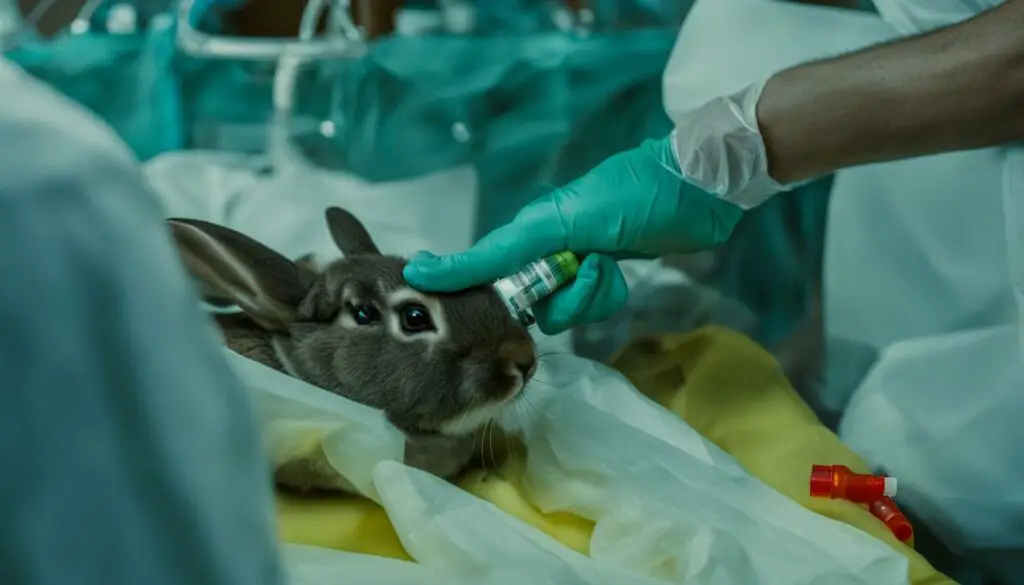When it comes to our furry friends, such as rabbits, their health and well-being are of utmost importance. In times of illness or recovery, providing proper critical care is essential to aiding their healing process and ensuring their overall wellness. This comprehensive guide is here to offer you valuable tips and advice on how to provide the best care for your rabbit’s health, covering topics such as emergency care, veterinary care, illness treatment, digestive health, recovery care, and more.
Key Takeaways:
- Rabbit critical care plays a vital role in their recovery and well-being.
- Emergency care and veterinary support are crucial for addressing rabbit health issues.
- Proper nutrition and digestive health are essential factors in rabbit critical care.
- Recovery care and ongoing support are necessary for a rabbit’s overall healing process.
- Having a first aid kit and knowing how to administer critical care are important for emergency situations.
Understanding Critical Care for Rabbits
Critical Care is a specially formulated rabbit food formula that plays a crucial role in providing necessary nutrition and hydration to rabbits during times of illness or recovery. It is designed to support their digestive health and overall well-being, ensuring they receive the nutrients they need for a speedy recovery. This specialized formula is a valuable tool in the care of rabbits, offering various benefits that contribute to their overall health and vitality.
One key benefit of Critical Care is its ability to support proper digestion in rabbits. When a rabbit is sick or recovering, their digestive system may become compromised, leading to a decrease in appetite and potential nutrient deficiencies. Critical Care is formulated to be easily digestible, providing essential nutrients that can be absorbed even when the rabbit’s digestive system is not functioning optimally.
In addition to aiding digestion, Critical Care also helps to ensure proper hydration in rabbits. Hydration is vital for a rabbit’s overall health and well-being, particularly during times of illness or recovery when they may be more prone to dehydration. The high moisture content of Critical Care helps to keep the rabbit hydrated, preventing complications and promoting a faster recovery.
| Benefits of Critical Care for Rabbits: |
|---|
| Easily digestible |
| Provides essential nutrients |
| Promotes hydration |
| Aids in a faster recovery |
Overall, understanding the importance of Critical Care in rabbit care is essential for providing optimal support to our furry companions during times of illness or recovery. By supplementing their diet with this specially formulated food formula, we can ensure that rabbits receive the necessary nutrition and hydration they need to regain their health and vitality.
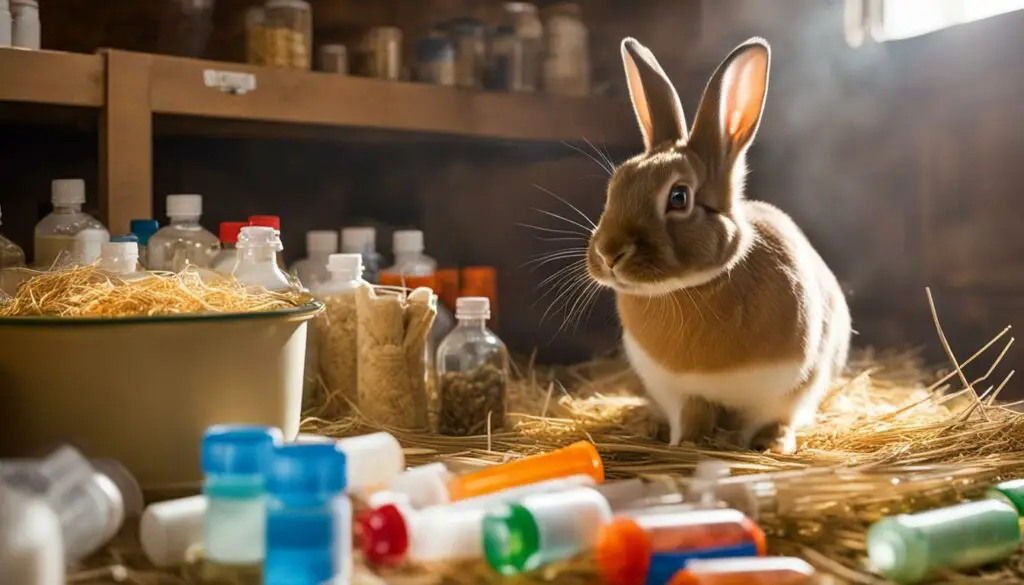
When to Use Critical Care for Your Rabbit
Rabbits are prone to various illnesses and health issues, and knowing when to use Critical Care is essential for their well-being. It is important to seek guidance from a qualified veterinarian before administering Critical Care to your rabbit. Your vet will evaluate your rabbit’s condition and determine the appropriate dosing and usage based on their specific needs.
Critical Care is designed to provide essential nutrition and hydration to rabbits during times of illness or recovery. It can be used when your rabbit is experiencing a lack of appetite or is unable to consume their regular diet. The underlying cause of your rabbit’s illness or digestive issues should be addressed by a veterinarian to ensure that Critical Care is the appropriate solution.
Common situations where Critical Care might be necessary include gastrointestinal stasis, dental issues, post-surgical recovery, or any other condition that affects your rabbit’s ability to eat and maintain proper nutrition. Always follow your veterinarian’s instructions on dosing and frequency of administration to ensure the best results for your rabbit’s recovery.

When to Use Critical Care for Your Rabbit:
- During periods of illness or recovery
- When your rabbit is experiencing a lack of appetite
- For conditions such as gastrointestinal stasis or dental issues
- Under the guidance of a qualified veterinarian
Remember, Critical Care should always be used as directed by your veterinarian. It is not a substitute for proper veterinary care, but rather a supportive measure to aid in your rabbit’s recovery. By working closely with your vet and following their recommendations, you can ensure that your rabbit receives the necessary nutrition and care during times of illness or recovery.
How to Prepare Rabbit Critical Care
Properly preparing rabbit Critical Care is essential to ensure your rabbit receives the necessary nutrition during their recovery. Follow these simple steps to prepare the powdered formula:
- Measure the appropriate amount of Critical Care powder based on your rabbit’s weight. Consult your veterinarian for the correct dosage.
- Place the measured powder in a clean bowl.
- Add water to the powder, following the instructions on the packaging. Typically, the ratio is one part powdered formula to two parts water.
- Mix the powder and water thoroughly until a pudding-like consistency is achieved.
- Ensure the mixture is smooth, without any lumps or clumps.
- Use immediately or refrigerate for later use.
It is important to note that the prepared Critical Care should be discarded if it has been left out at room temperature for more than two hours. It is best to prepare fresh batches as needed to maintain its nutritional value.
Feeding your rabbit Critical Care is necessary when they are unable to eat their regular diet due to illness or recovery. It should be given through a syringe or spoon-fed if your rabbit is willing to eat voluntarily. Always consult your veterinarian for specific feeding guidelines and dosage recommendations for your rabbit’s condition.

Recommended Feeding Schedule
The frequency of feeding Critical Care to your rabbit depends on their condition and appetite. Generally, it is recommended to feed small amounts frequently throughout the day. Here is a sample feeding schedule:
| Feeding Session | Time |
|---|---|
| Session 1 | Morning (8:00 AM) |
| Session 2 | Afternoon (12:00 PM) |
| Session 3 | Evening (5:00 PM) |
Adjust the feeding schedule based on your rabbit’s needs and appetite. It is important to monitor their weight and overall condition regularly and consult your veterinarian for any changes in their eating habits or health.
Feeding Recommendations for Rabbits on Critical Care
When it comes to feeding rabbits on Critical Care, it’s important to follow specific guidelines to ensure they receive the proper nutrition for their recovery. The amount of Critical Care to feed your rabbit depends on their weight and individual needs. Here are some feeding recommendations to help you provide optimal care:
Feeding Guidelines Based on Weight
To determine the appropriate amount of Critical Care for your rabbit, you need to consider their weight. Use the following guidelines as a reference:
| Rabbit Weight | Critical Care Dosage |
|---|---|
| 1-2 pounds | 10-14 cc (ml) every 4-6 hours |
| 2-4 pounds | 20-28 cc (ml) every 4-6 hours |
| 4-6 pounds | 30-42 cc (ml) every 4-6 hours |
| 6+ pounds | 50-70 cc (ml) every 4-6 hours |
It’s important to note that these are general guidelines and your veterinarian may recommend adjustments based on your rabbit’s specific condition.
Monitoring Your Rabbit’s Weight
Regularly monitoring your rabbit’s weight is crucial to ensure they are receiving the proper amount of Critical Care. Weigh your rabbit at least once a week to track their progress and make any necessary adjustments to their feeding regimen.
Remember to consult with your veterinarian before making any changes to your rabbit’s diet or feeding schedule, as they can provide personalized advice and guidance based on your rabbit’s individual needs.
Frequency of Feeding Rabbit Critical Care
Feeding your rabbit Critical Care at the right frequency is crucial for their recovery and overall well-being. The frequency of feeding will depend on your rabbit’s condition and appetite. It is important to split the daily amount of Critical Care into multiple feeding sessions throughout the day to ensure that your rabbit receives a sufficient amount of nutrition and hydration.
If your rabbit has a good appetite, you can offer small amounts of Critical Care every 4-6 hours. This frequent feeding schedule helps maintain their energy levels and supports the healing process. However, if your rabbit has a decreased appetite or is recovering from a critical illness, you may need to offer Critical Care every 2-3 hours to ensure they receive adequate nutrition and hydration.
Monitoring your rabbit’s appetite and body weight is essential in determining the frequency of feeding. If your rabbit is gaining weight and showing signs of improvement, you can gradually decrease the frequency of feeding. On the other hand, if your rabbit’s weight is stable or decreasing, it may be necessary to increase the frequency of feeding to provide them with the necessary nutrients for recovery.
Table: Recommended Frequency of Feeding Rabbit Critical Care
| Rabbit Condition | Frequency of Feeding |
|---|---|
| Good appetite, stable weight | Every 4-6 hours |
| Decreased appetite or critical illness | Every 2-3 hours |
| Weight gain and improvement | Gradually decrease frequency |
| Stable or decreasing weight | Increase frequency if necessary |
Remember to always consult with your veterinarian for specific recommendations tailored to your rabbit’s condition and needs. They will be able to guide you on the ideal frequency of feeding Critical Care based on your rabbit’s individual circumstances.

Step-by-Step Instructions for Syringe Feeding Rabbit Critical Care
Syringe feeding is a crucial technique for administering Critical Care to rabbits during their recovery phase. It ensures that they receive the necessary nutrition and hydration for a swift and healthy recuperation. Follow these step-by-step instructions to safely and effectively syringe feed your rabbit Critical Care:
Gather the necessary supplies:
- A syringe with a feeding tip
- Critical Care powdered formula
- Warm water
- A small bowl or cup for mixing
1. Measure the appropriate amount of Critical Care powder based on your rabbit’s weight and the veterinarian’s instructions. Put the powder in the mixing bowl.
2. Gradually add warm water to the powdered formula while stirring with a spoon until it reaches a smooth, pudding-like consistency.
3. Draw the prepared Critical Care mixture into the syringe, ensuring there are no air bubbles. Place the feeding tip on the syringe.
4. Gently secure your rabbit using a towel or a helper to keep them calm during the feeding process. Position the rabbit with their head elevated slightly.
5. Slowly introduce the syringe tip into the side of your rabbit’s mouth between the cheek and gums, aiming toward the back of the throat. Be careful not to insert it too far to avoid choking.
6. Depress the plunger on the syringe slowly to release a small amount of Critical Care into the mouth. Pause between each release to allow the rabbit to swallow.
7. Continue syringe feeding your rabbit small amounts of Critical Care until the recommended dosage is reached, as determined by your veterinarian.
Remember to observe your rabbit’s response during the feeding process. If any signs of distress or difficulty swallowing occur, stop immediately and consult your veterinarian for guidance. Syringe feeding can take time and patience, so approach it with a calm and gentle demeanor to ensure the best experience for both you and your rabbit.
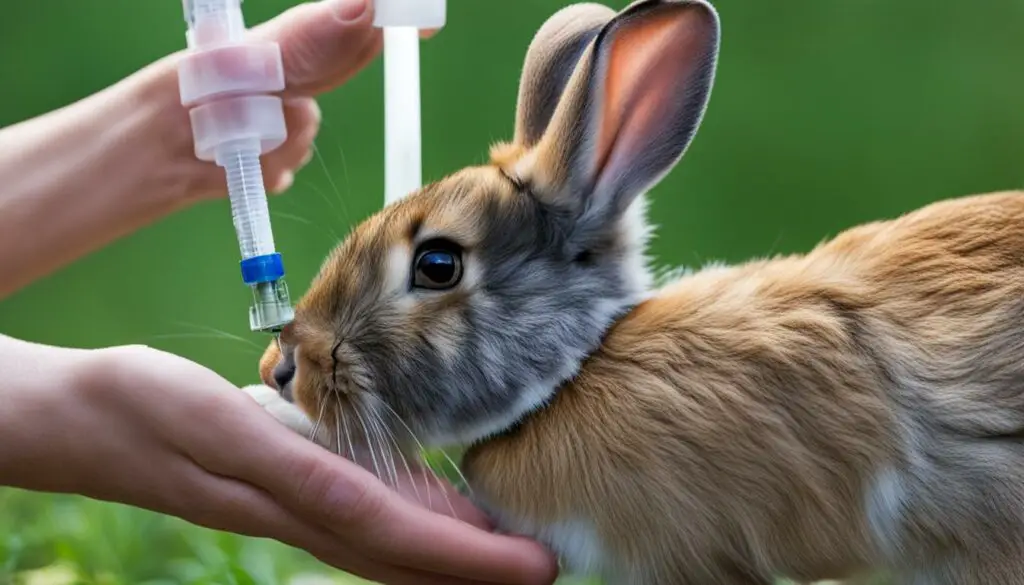
Homemade Alternatives for Rabbit Critical Care
In emergency situations where Critical Care is not readily available, there are homemade alternatives that can provide temporary nutrition and hydration for your rabbit. These alternatives can be a lifesaver when immediate care is needed for your furry friend. However, it is crucial to consult with a veterinarian for guidance and to ensure that you are providing the best possible care for your rabbit’s specific needs.
One homemade alternative for rabbit critical care is using rabbit pellets. These pellets can be ground into a fine powder and mixed with water to form a slurry-like consistency. This mixture can be syringe-fed to your rabbit, providing them with essential nutrients and hydration. It is important to note that the pellet-to-water ratio and consistency may vary depending on your rabbit’s condition and specific dietary requirements.

Another option is to create a hay-slurry mixture. Hay is an essential part of a rabbit’s diet and can be soaked in water to soften it. By blending the soaked hay with water, you can create a slurry that your rabbit can easily consume. This homemade alternative can help provide both nutrition and hydration to your rabbit during their recovery.
Remember, homemade alternatives should only be used as a temporary solution until you can obtain proper rabbit critical care products or consult with a veterinarian. These alternatives may not provide all the necessary nutrients and hydration that Critical Care formulated specifically for rabbits can offer. The goal is to provide your rabbit with immediate care while working towards obtaining the appropriate medical support for their recovery.
Tips for Syringe Feeding Your Rabbit
When it comes to syringe feeding your rabbit, it’s essential to approach it with care and patience. Here are some helpful tips and techniques to ensure a successful feeding process:
- Choose the right syringe: Opt for a small syringe with a soft, flexible tip that will be gentle on your rabbit’s mouth.
- Create a comfortable environment: Find a quiet, cozy space where your rabbit feels calm and secure. This will help reduce stress during feeding.
- Use a tasty incentive: Dip the tip of the syringe in a small amount of your rabbit’s favorite treat or Critical Care formula. This will entice your rabbit to accept the syringe and make the feeding process more enjoyable.
- Start slowly: Begin by offering small amounts of Critical Care at a time, allowing your rabbit to get accustomed to the taste and texture. Gradually increase the amount as your rabbit becomes more comfortable.
- Positioning matters: Gently hold your rabbit’s head and tilt it slightly upward. This will help prevent choking and ensure that the food goes down smoothly.
- Be patient and gentle: Syringe feeding can take time, especially if your rabbit is not used to the process. Stay calm, be patient, and use a gentle hand to avoid causing any discomfort.
Remember, syringe feeding is an important part of your rabbit’s recovery and well-being. By following these tips, you can make the process easier and ensure that your rabbit receives the nutrition they need to heal.
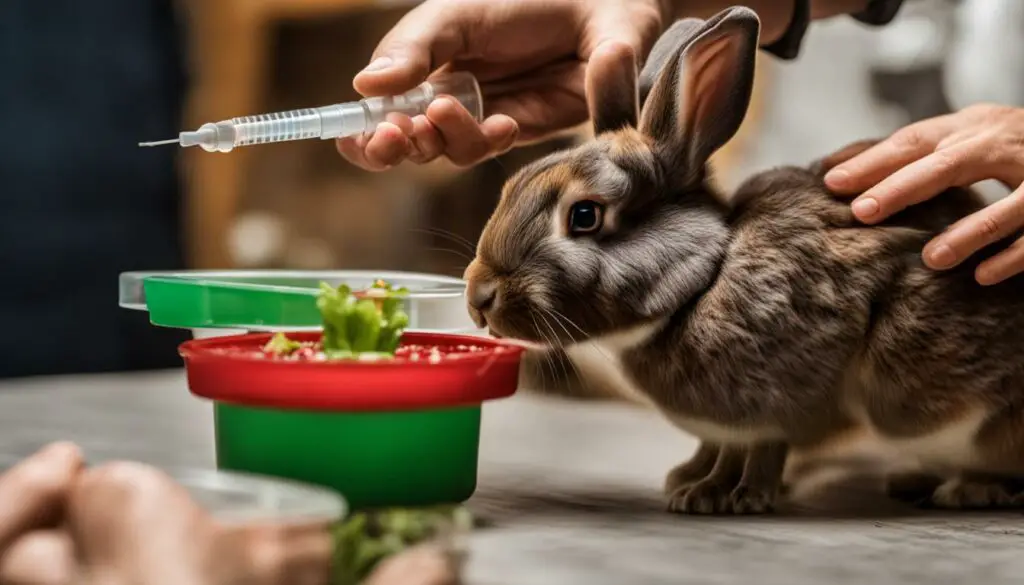
Tips for Easing Your Rabbit into Syringe Feeding
“Feeding your rabbit with a syringe can be a challenge, but with the right approach, it can become a stress-free experience for both you and your furry friend.” – Dr. Emily Johnson, DVM
If your rabbit is hesitant or resistant to syringe feeding, here are a few additional strategies that may help:
- Offer syringe-free taste testing: Before introducing the syringe, allow your rabbit to lick a small amount of Critical Care from a spoon or your finger. This will help them become familiar with the taste and associate it with something positive.
- Try different temperatures: Some rabbits may prefer their Critical Care warm, while others may prefer it chilled. Experiment with different temperatures to find what your rabbit enjoys most.
- Consult your veterinarian: If you’re struggling with syringe feeding or have concerns about your rabbit’s appetite, reach out to your veterinarian. They can provide guidance, offer additional techniques, or adjust the feeding plan to suit your rabbit’s needs.
With patience, consistency, and the right techniques, you can successfully syringe feed your rabbit and ensure their nutritional needs are met during their recovery process.
Storing and Using Critical Care for Rabbits
Proper storage and usage of Critical Care are essential for maintaining its effectiveness and ensuring the well-being of your rabbit. By following these tips, you can ensure that your rabbit receives the necessary nutrition and optimal recovery.
Storing Critical Care
When storing Critical Care, it is important to keep it in a cool, dry place to maintain its quality. Make sure to reseal the packaging tightly after each use to prevent moisture and air from entering. Avoid exposing the product to direct sunlight or extreme temperatures, as this can affect its shelf life. By storing Critical Care properly, you can ensure that it is ready to use when your rabbit needs it most.
Using Critical Care
When using Critical Care, carefully follow the instructions provided by your veterinarian. The dosage will depend on your rabbit’s condition and needs. Prepare the mixture by slowly adding water to the powdered formula, stirring until it reaches a pudding-like consistency. Use a syringe or feeding tube to administer the Critical Care to your rabbit, ensuring that they receive the necessary nutrition and hydration. It is important to monitor your rabbit’s progress and consult with your veterinarian to determine the appropriate duration of Critical Care usage.
Monitoring Shelf Life
It is crucial to monitor the shelf life of Critical Care to ensure its effectiveness. Check the expiration date on the packaging and discard any expired product. Additionally, pay attention to any changes in the appearance, smell, or texture of the formula, as these may indicate that it has gone bad. Using an expired or spoiled product can potentially harm your rabbit’s health. By regularly checking and monitoring the shelf life of Critical Care, you can provide your rabbit with the best possible care during their recovery.
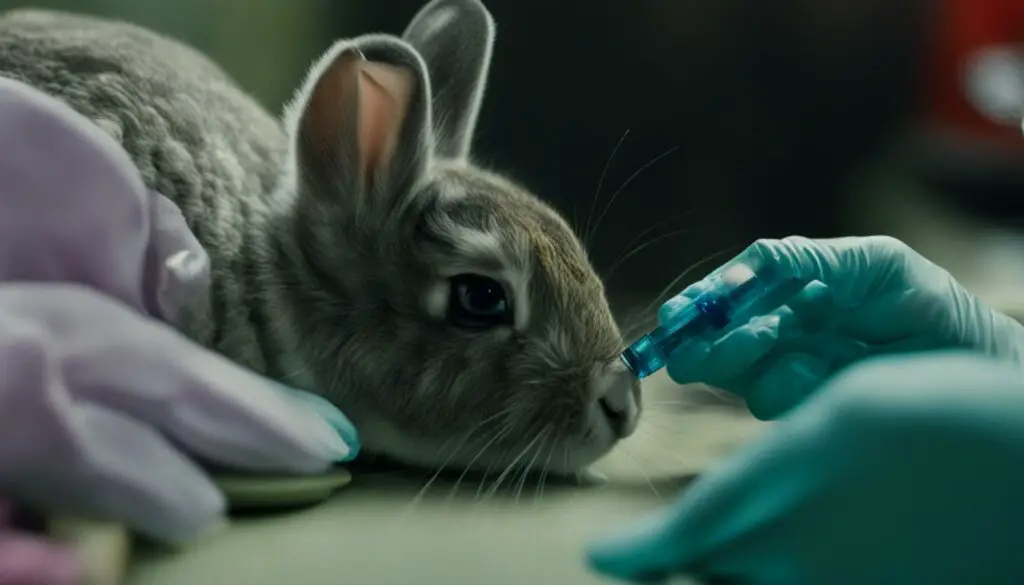
Conclusion
Proper storage and usage of Critical Care are vital for the well-being of your rabbit. By storing it correctly, following the instructions for usage, and monitoring its shelf life, you can ensure that your rabbit receives the necessary nutrition and care during times of illness or recovery. Remember to consult with your veterinarian for guidance and support throughout the process.
Additional Care Tips for Nursing a Sick Rabbit
When it comes to nursing a sick rabbit back to health, there are some additional care tips that can help ensure their well-being. These tips, alongside Critical Care and veterinary guidance, can provide the best possible support for your rabbit’s recovery and overall health.
1. Create a quiet and comfortable environment: Sick rabbits need a calm and stress-free environment to aid in their recovery. Ensure their living space is quiet, clean, and comfortable, with minimal disturbances or loud noises.
2. Monitor their appetite and hydration: Keep a close eye on your rabbit’s eating and drinking habits. If their appetite decreases or they show signs of dehydration, it is important to consult your veterinarian. They may require additional fluids or appetite stimulants to support their recovery.
3. Provide gentle exercise: While it’s important to allow your rabbit to rest, gentle exercise can help stimulate their digestion and prevent muscle loss. Consult your veterinarian for appropriate exercise recommendations based on your rabbit’s condition.
4. Keep them warm: Sick rabbits may struggle to regulate their body temperature, so it’s essential to provide a warm and draft-free environment. Use blankets or heating pads to keep them comfortable, but ensure they have the option to move away if they get too warm.
5. Administer medications as prescribed: If your rabbit requires medication, it’s crucial to follow the prescribed dosage and administration instructions. Be gentle and patient when administering medications to minimize stress for your rabbit.

Sick Rabbit Care Tips:
- Provide a quiet and comfortable environment
- Monitor appetite and hydration
- Provide gentle exercise
- Keep them warm
- Administer medications as prescribed
By following these additional care tips, you can provide the best possible support for your sick rabbit’s recovery and well-being. Remember to consult your veterinarian for personalized advice and guidance tailored to your rabbit’s specific needs.
Rabbit First Aid Kit Essentials
As a responsible rabbit owner, it is crucial to have a well-stocked first aid kit specifically designed for your furry friend. This kit will come in handy during emergencies or unexpected health issues, allowing you to provide immediate care before seeking professional help. Here are the essential items you should include in your rabbit’s first aid kit:
1. First Aid Supplies:
- Gauze pads and bandages: These are essential for covering wounds or controlling bleeding.
- Antiseptic solution: Use this to clean wounds and prevent infection.
- Tweezers: Helpful for removing any foreign objects that may be stuck in your rabbit’s fur or skin.
- Scissors: Use these to cut bandages or trim excess fur around wounds.
- Disposable gloves: Protect yourself from potential infections when handling your rabbit.
2. Medications and Treatments:
- Emergency medication prescribed by your veterinarian: This may include pain relievers or antibiotics.
- Styptic powder: Important for stopping bleeding if your rabbit accidentally breaks a nail or incurs a minor cut.
- Eye and ear cleaning solution: Use these treatments to maintain your rabbit’s ocular and aural health.
3. Basic Supplies:
- Soft towels or blankets: Provide comfort and warmth for your rabbit during transportation or while waiting for professional assistance.
- Pet carrier or cage: Use a secure carrier or cage to safely transport your rabbit during emergencies.
- Emergency contact list: Include phone numbers for your veterinarian, an after-hours emergency clinic, and a rabbit-savvy veterinarian.
- Flashlight: Ensure you can see clearly in case of a power outage or emergency situation.
It is essential to periodically check your rabbit’s first aid kit to ensure that all items are up to date and in good condition. This includes checking expiration dates of medications and restocking any used or depleted supplies. Remember, while a first aid kit is essential, it is not a substitute for professional veterinary care. If you are unsure how to administer first aid or if your rabbit’s condition is severe, always seek immediate veterinary assistance.
| Item | Quantity |
|---|---|
| Gauze pads and bandages | 10 |
| Antiseptic solution | 1 bottle |
| Tweezers | 1 pair |
| Scissors | 1 pair |
| Disposable gloves | 1 box |
| Emergency medication | As prescribed |
| Styptic powder | 1 container |
| Eye and ear cleaning solution | 1 bottle each |
| Soft towels or blankets | 2 |
| Pet carrier or cage | 1 |
| Emergency contact list | 1 copy |
| Flashlight | 1 |
By having a well-equipped first aid kit, you can provide immediate care to your rabbit during emergencies and ensure their well-being while seeking professional help. Remember, prevention is also key to minimizing the chances of emergencies, so always provide a safe and rabbit-friendly environment for your furry friend.
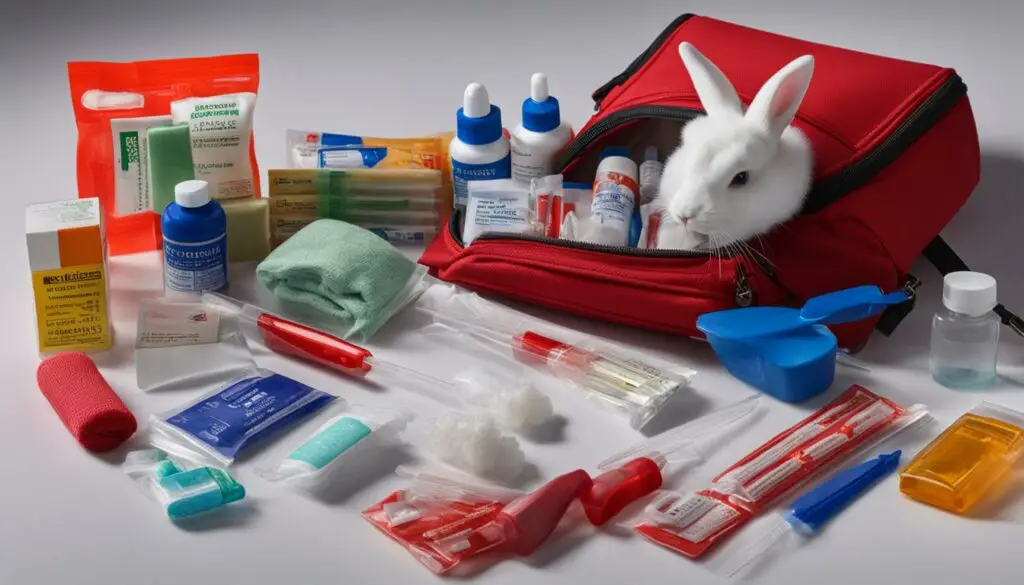
Conclusion
In conclusion, providing proper critical care is essential for the health and well-being of your rabbit. By understanding the benefits of rabbit critical care, such as the specially formulated Critical Care food, you can ensure that your furry friend receives the necessary nutrition and hydration during times of illness or recovery.
Remember, it is crucial to consult with a qualified veterinarian before administering Critical Care to your rabbit. They will determine the appropriate dosing and usage based on your rabbit’s specific condition and needs. Additionally, following the guidelines for preparing and feeding Critical Care, based on your rabbit’s weight and individual needs, will help optimize their nutrition and recovery.
While syringe feeding can be challenging, with the right techniques and tips, you can make the process easier and less stressful for both you and your rabbit. In emergency situations where Critical Care is not available, homemade alternatives can provide temporary nutrition and hydration. However, it is important to note that these should only be used as a temporary solution until you can obtain proper veterinary care.
Lastly, remember to have a first aid kit ready for any emergencies or unexpected health issues. Being prepared with essential items will ensure you can provide immediate care when needed. By following these guidelines and providing the best possible care, you can help your rabbit recover and maintain their overall health and well-being.
FAQ
When should I use Critical Care for my rabbit?
Critical Care should be used under the guidance of a qualified veterinarian when your rabbit is ill or experiencing a lack of appetite. It is important to understand the underlying cause of your rabbit’s condition before administering Critical Care.
How do I prepare rabbit Critical Care?
To prepare rabbit Critical Care, simply mix the powdered formula with water until it reaches a pudding-like consistency. Follow the instructions provided for proper preparation.
How much Critical Care should I feed my rabbit?
The amount of Critical Care to feed your rabbit depends on their weight and individual needs. Consult the feeding guideline based on your rabbit’s weight to determine the appropriate amount.
How often should I feed my rabbit Critical Care?
The frequency of feeding Critical Care to your rabbit will depend on their condition and appetite. It is recommended to split the daily amount into multiple feeding sessions throughout the day.
How do I syringe feed my rabbit with Critical Care?
Syringe feeding your rabbit with Critical Care involves gently and slowly administering the formula using a syringe. Follow the step-by-step instructions provided to ensure safe and effective syringe feeding.
What can I use as a homemade alternative for Critical Care?
In emergency situations where Critical Care is not available, you can use homemade alternatives using rabbit pellets and other safe ingredients. This can provide temporary nutrition and hydration for your rabbit until you can obtain proper care.
How can I make syringe feeding easier for my rabbit?
Syringe feeding can be challenging, but with the right techniques, it can become easier and less stressful. Follow the provided tips and advice to syringe feed your rabbit effectively and safely.
How should I store and use Critical Care for my rabbit?
Proper storage and usage of Critical Care are crucial for maintaining its effectiveness. Follow the provided information on how to store and use Critical Care, including tips on maximizing its shelf life.
What other care tips should I consider when nursing a sick rabbit?
In addition to providing Critical Care, there are other important care tips to consider for your rabbit’s overall health and well-being during their recovery. Refer to the section on additional care tips for more guidance.
What should I include in my rabbit’s first aid kit?
As a responsible rabbit owner, it is important to have a first aid kit on hand for emergencies or unexpected health issues. The section on rabbit first aid kit essentials provides a list of the essential items you should include.

